|
|
|
Sort Order |
|
|
|
Items / Page
|
|
|
|
|
|
|
| Srl | Item |
| 1 |
ID:
148444
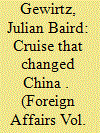

|
|
|
|
|
| Summary/Abstract |
On September 2, 1985, the SS Bashan cruised through the green-leaved gorges of the Yangtze River, its prow breaking the waters along its 259-foot length. Inside, the river’s shifting light played off the hallways, staterooms, and modish decorations, and air conditioning kept the late-summer heat at bay. The luxurious cruise ship had entered service earlier that year, with room for nearly 150 passengers curious to see sights advertised as “inspir[ing] romantic poets and painters with [a] sense of timelessness, awesome beauty, and endless energy.” But the spacious decks of the Bashan were strangely empty.
|
|
|
|
|
|
|
|
|
|
|
|
|
|
|
|
| 2 |
ID:
148445
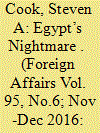

|
|
|
|
|
| Summary/Abstract |
On January 25, 2011, tens of thousands of Egyptians took to the streets, demanding an end to the nearly 30-year rule of President Hosni Mubarak. Eighteen days later, Mubarak stepped down. In Tahrir Square, the crowds cried, “Lift your head high, you’re an Egyptian.” “We can breathe fresh air, we can feel our freedom,” Gamal Heshmat, a former member of parliament, told The New York Times [2]. “After 30 years of absence from the world, Egypt is back.”
|
|
|
|
|
|
|
|
|
|
|
|
|
|
|
|
| 3 |
ID:
148446
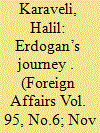

|
|
|
|
|
| Summary/Abstract |
What happened to Recep Tayyip Erdogan? The Turkish president came to power in 2003 promising economic and political liberalization. But under his rule, Turkey has instead moved in a profoundly illiberal, authoritarian direction—although not toward repressive Islamism, which some feared was Erdogan’s true agenda, given his background in Islamist politics. Rather, Erdogan has become something more akin to a traditional Middle Eastern strongman: consolidating personal power, purging rivals, and suppressing dissent.
|
|
|
|
|
|
|
|
|
|
|
|
|
|
|
|
| 4 |
ID:
148437


|
|
|
|
|
| Summary/Abstract |
The year 2015 was a dreadful one for Europe in general and for the EU in particular. It started with the terrorist attack [2] against the magazine Charlie Hebdo in Paris and ended with an even more deadly jihadist assault [3] in the same city. In between, the EU battled an economic crisis in Greece, which threatened the entire eurozone, and endured a staggering inflow of refugees from the Middle East and other war-torn regions.
|
|
|
|
|
|
|
|
|
|
|
|
|
|
|
|
| 5 |
ID:
148435


|
|
|
|
|
| Summary/Abstract |
As the youngest daughter of Jean-Marie Le Pen, the founder of the right-wing French political party the National Front, Marine Le Pen grew up in politics, starting to campaign with her father at 13. Trained as a lawyer, she won her first election in 1998, as a regional councilor, and in 2011, she succeeded her father as party leader. She soon distanced herself from his more extreme positions, and eventually—after he reiterated his claim that the Holocaust was a “detail” of history [1]—she expelled him from its ranks. These days, in the wake of the European migrant crisis, the terrorist attacks in Paris and Nice, and the Brexit vote [2], Le Pen’s nationalist, Euroskeptical, anti-immigrant message is selling well. Recent polls show her as a leading candidate for the presidency in 2017, with respondents preferring her two to one over the Socialist incumbent, François Hollande. Le Pen spoke with Foreign Affairs’ deputy managing editor Stuart Reid in Paris in September.
|
|
|
|
|
|
|
|
|
|
|
|
|
|
|
|
| 6 |
ID:
148440


|
|
|
|
|
| Summary/Abstract |
In September 1919, the Italian poet Gabriele D’Annunzio gathered a force of 2,000 mutinous troops from the Royal Italian Army, along with hundreds of other volunteers, and stormed the city of Fiume, on the Adriatic coast, which had been contested territory since the end of World War I. D’Annunzio had served as a fighter pilot in the war, and his daring feats had turned him into one of the most famous people in Europe. An ultranationalist, he had long wanted “Mother Italy” to seize all the territories that he believed rightly belonged to her. In 1911, he had zealously supported Italy’s invasion of Libya, an imperialist adventure whose savagery stoked outrage across the Muslim world. In Fiume, he saw a chance to realize his dream of rejuvenating Italy through war.
|
|
|
|
|
|
|
|
|
|
|
|
|
|
|
|
| 7 |
ID:
148442
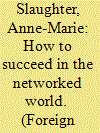

|
|
|
|
|
| Summary/Abstract |
Foreign policy experts have long been taught to see the world as a chessboard, analyzing the decisions of great powers and anticipating rival states’ reactions in a continual game of strategic advantage. Nineteenth-century British statesmen openly embraced this metaphor, calling their contest with Russia in Central Asia “the Great Game [2].” Today, the TV show Game of Thrones [3] offers a particularly gory and irresistible version of geopolitics as a continual competition among contending kingdoms.
|
|
|
|
|
|
|
|
|
|
|
|
|
|
|
|
| 8 |
ID:
148438


|
|
|
|
|
| Summary/Abstract |
On the morning of October 17, 1945, thousands of protesters in Buenos Aires marched on Argentina’s main executive building, the Casa Rosada, to demand the return of Vice President Juan Perón [2], who had been forced to resign a week earlier. The day was hot, and many of the men took off their jackets and even their shirts. This earned them the mocking title of los descamisados—“the shirtless.” Perón’s supporters promptly reclaimed the insult [3] and turned it into a badge of honor. When Perón ran for president in the 1946 election as an unabashed populist, he toured the country in a train he named El Descamisado after his followers.
|
|
|
|
|
|
|
|
|
|
|
|
|
|
|
|
| 9 |
ID:
148439
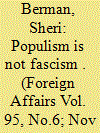

|
|
|
|
|
| Summary/Abstract |
As right-wing movements have mounted increasingly strong challenges to political establishments across Europe and North America, many commentators have drawn parallels to the rise of fascism during the 1920s and 1930s. Last year, a French court ruled that opponents of Marine Le Pen, the leader of France’s National Front [1], had the right to call her a “fascist”—a right they have frequently exercised. This May, after Norbert Hofer, the leader of Austria’s Freedom Party, nearly won that country’s presidential election, The Guardian asked [2], “How can so many Austrians flirt with this barely disguised fascism?” And in an article that same month about the rise of Donald Trump [3], the Republican U.S. presidential candidate, the conservative columnist Robert Kagan warned, “This is how fascism comes to America.
|
|
|
|
|
|
|
|
|
|
|
|
|
|
|
|
| 10 |
ID:
148441


|
|
|
|
|
| Summary/Abstract |
In April, I laid a wreath at the Manila American Cemetery, in the Philippines [1], where some 17,000 Americans are buried. Looking up at the mosaic maps of battles whose names still echo throughout the U.S. Department of Defense—Guadalcanal, Midway, Leyte Gulf, and more—it is hard not to appreciate the essential role that the U.S. military has long played in the Asia-Pacific. Many of the individuals buried in the cemetery helped win World War II [2]. For the people and nations of the region, they also won the opportunity to realize a brighter future.
|
|
|
|
|
|
|
|
|
|
|
|
|
|
|
|
| 11 |
ID:
148443


|
|
|
|
|
| Summary/Abstract |
On June 30, a week after the British public voted to leave the EU [2], Theresa May gave a speech [3] launching her candidacy for prime minister in which she declared, “Brexit means Brexit.” Her message was straightforward: even though she herself had supported remaining in the EU, she would not hesitate to implement the will of the voters. Yet months after assuming office, May has yet to answer crucial questions about what a British exit, or Brexit, would mean for trade, immigration, and financial services. It is still not at all obvious what Brexit will actually look like [4].
|
|
|
|
|
|
|
|
|
|
|
|
|
|
|
|
| 12 |
ID:
148436


|
|
|
|
|
| Summary/Abstract |
Donald Trump is an unlikely populist [1]. The Republican nominee for U.S. president inherited a fortune, boasts about his wealth and his many properties, shuttles between his exclusive resorts and luxury hotels, and has adopted an economic plan [2] that would, among other things, slash tax rates for rich people like himself. But a politician does not have to live among people of modest means, or even tout policies that would boost their incomes, to articulate their grievances and gain their support. Win or lose, Trump has tapped into a deep vein of distress and resentment among millions of white working- and middle-class Americans.
|
|
|
|
|
|
|
|
|
|
|
|
|
|
|
|
|
|
|
|
|